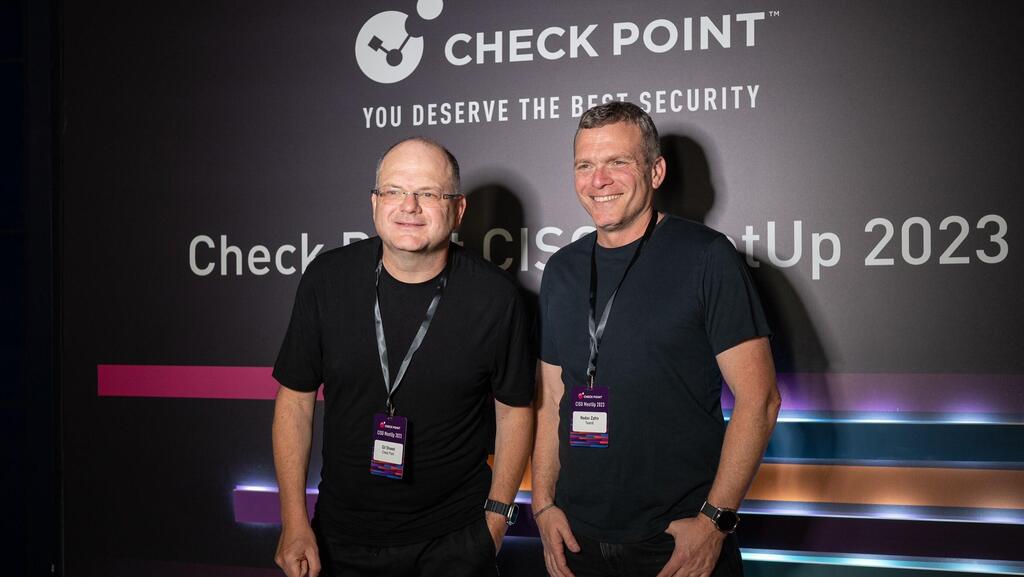
Can Check Point's new CEO help it realize its full potential?
Check Point has everything it needs to succeed and become a true cyber giant. What it lacks is exactly what incoming CEO Nadav Zafrir brings: an entrepreneurial spirit and boldness. Its success will depend, in part, on the ability of the mythical founder Gil Shwed to loosen the reins enough to change the company's DNA.
The appointment of Nadav Zafrir as CEO of Check Point is a surprising development. On one hand, who better than the former Unit 8200 commander to lead the company that essentially founded the global cyber market thirty years ago? On the other hand, Zafrir represents a completely different approach than what has characterized Check Point since its inception.
Check Point is indeed a profitable machine, but it is conservative and employs about 7,000 people. It is considered somewhat behind in the aggressive game played by younger cyber companies. Recent news highlights this: Google’s offer to purchase the young and small Wiz for $23 billion contrasts sharply with Check Point’s market value of "only" $20 billion, an all-time high.
Zafrir joins Check Point after leading the venture capital fund Team8 for the past decade, a fund he founded with a unique and innovative model for building companies in an incubator-like environment. During this time, Zafrir became an expert in growing and nurturing start-ups, accelerating them rapidly without focusing heavily on profitability, and achieved several impressive exits. This is exactly the opposite of what Gil Shwed advocates for Check Point, which was built in his image, especially since the other two partners in its founding - Shlomo Kramer and Marius Nacht - left long ago.
Related articles:
Cyber sex appeal, innovation and entrepreneurial spirit
Half a year after Gil Shwed, the eternal CEO of Check Point and one of the oldest CEOs on Wall Street, announced he would step down in favor of a new CEO, Check Point has named Zafrir as his successor. For many in the capital market and the cyber world, the timing was surprising because it seemed Shwed would delay the process as much as possible. However, on Wednesday, the company announced that Zafrir (54) would replace Shwed (55), also a veteran of 8200, with Shwed moving to serve as executive chairman.
Relative to his typical restraint, Shwed was enthusiastic in describing Zafrir's suitability for the job and his excitement for their future collaboration. "This is a very exciting day for me; there are both good results and extraordinary news - a new CEO for Check Point," Shwed said at a press conference. "We conducted a very serious and thorough search process. We said in advance that it would not be easy to find the perfect CEO, but we found one. Nadav is a cyber expert with a global reputation, an entrepreneur, and an exceptional leader. I am glad he agreed to take on this role. I see him as an excellent partner for building the future of the company and breaking new records. CISOs around the world all know Nadav, who also has management experience from his days in the IDF. It took me many years to learn to run a huge organization, and Nadav is entering a supportive system, and I am also staying here to help. I have spent a lot of time with Nadav, and this has made me a big supporter of his. It's not hard for me; I'm in a place where I couldn't be happier. We interviewed candidates from the U.S., Europe, and Israel, and from the beginning, we determined there would be a preference for Israelis."
Shwed’s superlatives are accurate and can serve as a springboard for Check Point. Although the company is often referred to as a "cyber giant," younger and more energetic competitors such as CrowdStrike and Palo Alto have overtaken it in terms of revenues, market multiples, and market value. The only metric where Check Point has no competitors is its exceptional profitability. Yesterday, it published financial results for another quarter that was very similar to its predecessors, with single-digit growth to revenues of $627 million and a net profit of approximately $200 million, bringing its annual revenues to approximately $2.5 billion.
Check Point generates about $200 million in profit every quarter, giving Zafrir a cash fund of $3 billion with which he can do a lot. Fortunately for Zafrir, Check Point has everything it needs to succeed and become a real cyber giant. What it lacks is exactly what Zafrir brings: cyber sex appeal, innovation, and an entrepreneurial spirit. As Shwed rightly pointed out, today, there is no self-respecting cyber officer in the world who does not know Zafrir. While Shwed, Kramer, Palo Alto’s Nir Zuk, and the younger generation of "8200" enjoy the aura of the unit, Zafrir was also its commander and served in Sayeret Matkal (General Staff Reconnaissance Unit). He is a sought-after lecturer worldwide.
Zafrir began his career in the IDF in Sayeret Matkal, received a medal of honor from the Chief of Staff, and was then placed in 8200. He was released from the IDF after 25 years in 2013 and shortly after founded Team8. Additionally, he serves as the chairman of SolarEdge, a company that until recently competed head-to-head with Check Point for the title of the most valuable Israeli company but recently faced a severe crisis. Surprisingly, Check Point said yesterday that Zafrir would continue with SolarEdge, despite the company currently requiring a lot of attention and management resources. Those who view this positively see it as a testament to Zafrir's essential and irreplaceable role at SolarEdge.
Zafrir will officially take office this December, and it will be interesting to follow his relationship with Shwed after the initial honeymoon phase. Check Point is synonymous with powerful technology but has been slow to enter the cloud and other categories within the expanding cyber market. The barrier to this was likely Shwed, who prioritizes profitability and conservatism over bold moves, like those taken by Palo Alto, which has acquired numerous companies, some of them Israeli, in recent years.
Although Shwed is considered a super-technologist and talented manager who almost never misses quarterly forecasts, he has faced harsh criticism over the years. This criticism not only pertains to the small number of acquisitions and relatively small-scale purchases, having preferred not to be extravagant and not to pay a premium for the best companies in the category, but also regarding employee compensation. Today, Check Point is considered an excellent school for cyber professions but not the preferred workplace, which belongs to flashier names like Wiz or Palo Alto that are considered much more generous to employees.
Shwed has stated from the beginning, and reiterated yesterday, that he is not looking for a copy of himself or a manager in his likeness. However, Zafrir’s success depends significantly on Shwed’s ability to let go of the reins, to the point of changing Check Point's DNA. It is important to remember that, unlike most CEOs of high-tech companies, Shwed is also the largest shareholder in Check Point, owning 23% of the company, worth approximately $4.5 billion. After last Friday's CrowdStrike fiasco and Palo Alto stuttering in recent quarters, even starting to give away free products to maintain market share, Check Point is in a great starting position. It just needs to step on the gas, use its cash for bolder moves, and closing the value gap with its competitors can happen quite quickly. One can even look at the example of Teva, which was almost eulogized but is soaring in recent months with the focused and reasoned strategic plan of its relatively new CEO Richard Francis.
Global cyber market shift
The difficulty for Shwed in allowing Zafrir to implement these changes can be gauged from his answer to a question about a possible change in the company's DNA. "There are companies that even when they grow, they continue to lose. Nadav knows that he is joining a super successful company; our profitability is a tremendous strength because it gives the company's management and the CEO enormous power. It is not due to the mood of the investors. I never lacked resources; we always did what was right and succeeded. Bringing in another entrepreneurial spirit won't hurt us." With this answer, Shwed subtly jabbed at Palo Alto Networks, which only recently became profitable with revenues of about $8 billion and is traded at a value of more than $100 billion.
Zafrir, who will need to adapt to being an employee again after a decade of self-employment, is essentially getting a Volvo – an excellent and reliable car, but rather boring. His goal will be to turn it into a Bentley – an equally prestigious and solid car, but much more sparkling and awe-inspiring. The fact that Shwed will "hold" his hand should reassure investors that the changes will not be too rash. If the chemistry between the two remains as good as it appears now, Zafrir’s experience, knowledge, and international prestige could turn Check Point into a new threat for the entire global cyber market, reflecting favorably on Israel. Along the way, it could also close a significant gap. Israel is the destination for a third of the world's cyber investments, but in terms of company revenues, it is much smaller. Check Point's return to a rapid growth rate could change this statistic as well.
The first and immediate sign of what Zafrir’s appointment can do for Check Point and the Israeli cyber scene is seen in the 7% jump in the company's stock on Wednesday, an increase not seen in a long time, bringing its value to $20 billion, already making it the largest Israeli company in terms of market capitalization.

